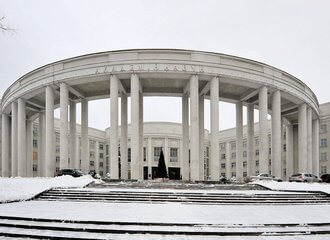На русском языке:
«Повтор санкционной истории в России»: Экономист о том, как эмбарго отразится на беларусах
На беларускай мове:
Паўтор санкцыйнай гісторыі ў Расіі: Эканаміст расказвае, як эмбарга адаб’ецца на беларусах
Yesterday, the Resolution of the Council of Ministers of the Republic of Belarus dated 06.12.2021 №700 «On Application of special measures against certain types of goods» was published, which prohibits the import and sale of goods from «unfriendly» countries.
The Resolution establishes a list of goods originating from the European Union and its member states, the United States of America, Canada, the Kingdom of Norway, the Republic of Albania, the Republic of Iceland, the Republic of North Macedonia, the United Kingdom of Great Britain and Northern Ireland, Montenegro, the Swiss Confederation, prohibited for import into the territory of the Republic of Belarus and sale in the territory of the Republic of Belarus.
Irina Sazanovich, a member of the economic group of Sviatlana Tsikhanouskaya’s Office, told how the food embargo will affect business, enterprises and Belarusians.
This ban will affect meat, dairy products, fruits, vegetables, nuts, confectionery and other food products (CN FEA codes 1901 90, 2106 90). At the same time, the Ministry of Agriculture, Belgospischeprom, regional executive committees, the Minsk City Executive Committee are obliged to ensure the saturation of the domestic market with a wide range of food products produced in the Republic of Belarus. In addition, the Ministry of Antimonopoly Regulation and Trade (MART), the Ministry of Agriculture, Belgospischeprom, commodity producers, importers and trade organizations are obliged to ensure compliance with the established parameter of the consumer price index, including for goods for processing and quota goods.
The resolution fits quite appropriately into the logic of the «bombing of Volozhin». Because «unfriendly» countries are unlikely to feel the serious consequences, since Belarus is not the main trading partner for any of the countries from the declared list and the volumes of products from the list that were supplied to Belarus were not significant for these countries.
«In fact, there will be a repeat of the sanctions story in Russia, with the only difference that Belarus will not have another «Belarus» ready to import the banned goods under the guise of its own products»,– the expert says.
Therefore, imported cheese and sausage, imported chocolate and chewing gum, Polish apples, and other products that were traditionally purchased in European countries will disappear from the shelves of stores. Most of all, urban wealthy consumers will feel this, since in rural areas the consumption of expensive imported products was already minimal.
For the enterprises using imported raw materials from the listed list, a quota mechanism will be introduced, which will naturally put private businesses in a deliberately worse position and create conditions for enriching «sheltered» businesses through privileged access to quotas.
In the best traditions of Belarusian state management, prices were ordered not to grow, and the assortment not to decrease. At the same time, there is no understanding in the country’s leadership that these are mutually exclusive requirements. What are the basic laws of microeconomics and how the decreasing supply affects the price – none of this was explained to the Council of Ministers either.


